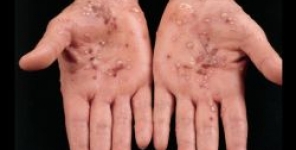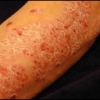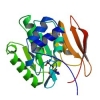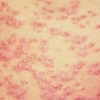La medicina naturale topica in combinazione con la terapia farmacologica per il trattamento della psoriasi: una revisione sistematica e una meta-analisi
 Questa revisione sistematica esamina la situazione attuale riguardo l'efficacia e la sicurezza dei medicinali a base di erbe (HMs) utilizzati per via topica in combinazione con la farmacoterapia anti- psoriasica (APP) nel trattamento della psoriasi stessa.
Questa revisione sistematica esamina la situazione attuale riguardo l'efficacia e la sicurezza dei medicinali a base di erbe (HMs) utilizzati per via topica in combinazione con la farmacoterapia anti- psoriasica (APP) nel trattamento della psoriasi stessa.
Nel settembre 2012 sono state condotte alcune ricerche su PubMed, EMBASE, Cochrane Library, su due database Cinesi (il China National Knowledge Infrastructure e il Chinese Scientific Journals Full Text Database) e sulle liste di riferimento dell'articolo.
Abbiamo incluso gli studi randomizzati e controllati tra quelli pubblicati in lingua inglese, cinese o giapponese che avevano indagato l'uso degli HM topici combinati con APP per via sistemica e/o topica, rispetto alla sola farmacoterapia; invece, sono stati esclusi tutti gli studi che impiegavano la fototerapia. Due autori hanno condotto delle ricerche, hanno estratto i dati riguardo le caratteristiche e i risultati dello studio, e hanno anche valutato il rischio di bias.
I disaccordi sugli argomenti sono stati risolti attraverso la discussione con un terzo autore. Alla fine, otto studi hanno soddisfatto i criteri di inclusione: tutti hanno utilizzato una formula multi- erbe, quattro in bagni di erbe, tre in unguenti o creme a base di erbe, e uno come vapore alle erbe. I dati raccolti hanno indicato un beneficio nell'effetto aggiuntivo della terapia a base di erbe rispetto ad APP, tanto che l'aggiunta di questi HMs topici alla farmacoterapia convenzionale sembra produrre dei benefici clinici aggiuntivi, almeno nel breve termine. Non sono stati segnalati gravi effetti collaterali. Gli studi sperimentali suggeriscono che alcune delle erbe possiedono attività anti-infiammatorie, anti-pruriginose, e/o anti- proliferative. Tuttavia, questi risultati devono essere interpretati con cautela a causa di carenze metodologiche e perché gli studi non sono stati ancora replicati. Ad ogni modo, sono necessari studi che affrontino le carenze metodologiche individuate così da approfondire l'efficacia e la sicurezza degli HMs come terapie ausiliari per la psoriasi.
Storia della pubblicazione:
Titolo: Topical herbal medicine combined with pharmacotherapy for psoriasis: a systematic review and meta-analysis
Rivista: Archives of Dermatological Research. April 2013, Volume 305, Issue 3, pp 179-189
Autori: Shiqiang Deng, Brian H. May, Anthony L. Zhang, Chuanjian Lu, Charlie C. L. Xue
Affiliazioni:
Abstract:
This systematic review examines the current state of the evidence for the efficacy and safety of herbal medicines (HMs) used topically in conjunction with anti- psoriatic pharmacotherapy (APP) in the treatment of psoriasis. Searches were conducted in September 2012 of PubMed, EMBASE, Cochrane Library, two Chinese databases (China National Knowledge Infrastructure and Chinese Scientific Journals Full Text Database) and of article reference lists. We included randomized controlled trials published in English, Chinese or Japanese that investigated topical HM combined with APP used systemically and/or topically compared to pharmacotherapy alone. Studies employing phototherapy were excluded. Two authors conducted searches, extracted data on study characteristics and outcomes, and assessed Risk of Bias. Disagreements were resolved by discussion with a third author. Eight studies met the inclusion criteria. All used multi-herb formulae, four in herbal baths, three in herbal ointments or creams, and one as herbal steam. The pooled data indicated a benefit for the add-on effect of herbal therapy to APP. Adding these topical HMs to conventional pharmacotherapy appeared to produce short-term additional clinical benefits. No serious adverse events were reported. Experimental studies suggest that some of the herbs possess anti-inflammatory, anti- pruritic, and/or anti- proliferative activities. However, these results need to be interpreted with caution due to methodological weaknesses and the lack of replicated studies. Studies that address the identified methodological deficiencies are required to further investigate the efficacy and safety of these HMs as adjunct therapies for psoriasis.




